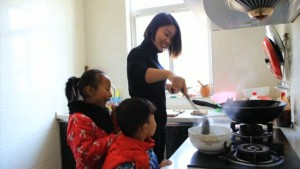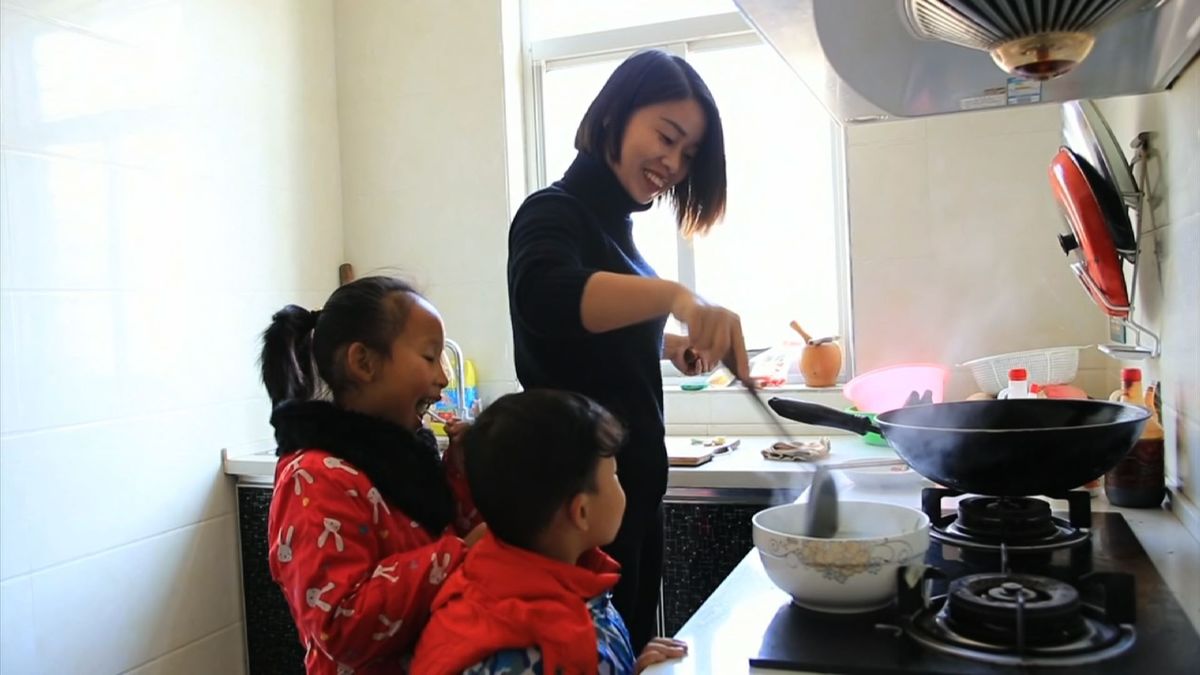 XIANGYANG, China: With two young children, Deng Guilian hadn’t planned on going back to work. That changed after her husband was arrested while investigating labor abuses at Chinese suppliers for Ivanka Trump’s brand.
XIANGYANG, China: With two young children, Deng Guilian hadn’t planned on going back to work. That changed after her husband was arrested while investigating labor abuses at Chinese suppliers for Ivanka Trump’s brand.
Now the 36-year-old mom works the overnight shift at a karaoke parlor and stays in a dorm nearby. She gets just three days off a month to see her kids.
“They seem accustomed to not having their mom,” Deng said of her 7-year-old daughter, Chen Chen, and 4-year-old son, Bo Bo.
She flashed an uneasy smile.
Ivanka Trump has sought to bring an aura of female empowerment to her lifestyle brand and spoken out for women’s rights from her post at the White House. But her legacy has been less than empowering for at least one woman in China.
In May, Deng’s husband, Hua Haifeng, and two of his colleagues were accused of illegally using secret recording devices and thrown in jail while investigating factories that made shoes for Ivanka Trump’s brand. The group they were working for, a New York non-profit called China Labor Watch, obtained evidence of forced overtime and pay as low as $1 an hour, as well as a video of a manager berating a worker for apparently arranging shoes in the wrong order.
“If I see them f—ing messed up again,” the manager yells, “I’ll beat you right here.” Another worker was left with blood dripping from his head after a manager hit him with the sharp end of a high heeled shoe, according to three eyewitnesses who spoke to the AP.
The Huajian Group, which runs the factories where the abuses allegedly occurred, has called the charges “completely not true to the facts.”
The investigators were released after 30 days, but the bail conditions – restrictions on travel, regular meetings with the police – have made it hard for Hua to find work.
Hua was ordered not to speak to the media and declined to comment for this story.
Ivanka Trump, who still owns but no longer closely manages her namesake brand, has remained silent about human rights issues within her brand’s supply chain – and labor conditions in China, where tons of her products are made and a generation of women like Deng has left their children to go work.
“As a public figure, she has the ability and resources to not only work on labor conditions at her own brand’s factories, but also to help improve labor conditions of the global supply chain as a whole,” said China Labor Watch founder Li Qiang. “However, she did not use her influence to do these things.”
Trump’s brand and spokesman declined to comment for this story, but in her 2017 best-seller, “Women Who Work,” Trump spoke about her commitment to improving “the lives of countless women and girls” and acknowledged that her father’s presidential campaign gave her “an unprecedented opportunity to advocate for change.”
Her daughter, Arabella, who is one year younger than Chen Chen, has also been an inspiration.
“When I think about the opportunities Arabella will have available to her in the United States, compared with some of the six hundred million girls growing up in developing countries, I’m even more inspired to make a difference,” she wrote.
Arabella and her two little brothers are her “greatest passion,” Ivanka Trump wrote. “I’m the first person they see in the morning, and the last to give kisses at night.”
Deng, meanwhile, has traded life with her kids for a mirrored room at a karaoke parlor, where she sells drinks and snacks on the 6 p.m. to 2 a.m. shift. Days she spends in a dormitory, where she and a co-worker share a bed with a Snoopy headboard. Room and board are free, but she makes less than 2000 yuan ($316) a month. It’s not enough.
Neighbors in their small, hardscrabble town on the outskirts of Xiangyang, in central China’s Hubei province, seem convinced Hua sold state secrets to the U.S., Deng said. The family worries Hua could get plucked up by police any day and vanish from their lives again. But Deng said she has no regrets.
“Maybe he’s not such a big, important person,” she said. “But every time he helps a worker resolve a problem, put yourself in that person’s position. Personally, I think it’s a very meaningful thing to do.”
Deng said her children have become more subdued since their father’s time in jail.
“The shadow is that when they don’t see their father, they keep calling him,” she said. Bo Bo has grown reasonable beyond his years. “He’s such a small child but when he talks he seems just like an adult,” Deng said, while Chen Chen tends to follow her dad around. “My daughter has never asked about what happened, but I can sense she knows many things.”
On a recent Sunday off, Deng’s children wandered in and out of the kitchen as she cooked. Their house is so cold everyone keeps their coats on inside.
At 5 p.m., when it was time for Deng to go back to work, Bo Bo darted around his mom. Chen Chen sat at a small table nearby, coloring.
“Do you want to see mama off?” Deng called to her daughter.
“No,” Chen Chen muttered.
Deng tried again: “Come on, what’s wrong? You’re not happy?”
Chen Chen stared at her pink marker.
Finally, Deng had to go. She mussed her son’s hair as they walked out into the last light of day. Bo Bo closed the big metal gate after his mom.
Chen Chen kept coloring.-AP







